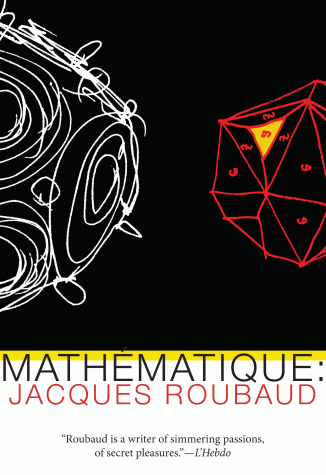
Mathematics: (a novel)
by Jacques Roubaud
Dalkey Archive, 2012
312 Pages, $14.95
Buy from Dalkey Archive or Amazon
Jacques Roubaud, a premiere intellectual force throughout the history, to some extent, of French letters, as they say, is primarily known to American readers as a member of the OuLiPo and a poet. Roubaud’s reach, however, spans far beyond these simple categorical realms, throughout his massive ouevre of work, much of which has actually be translated into English.
Mathematics:, while recalling ideas, perhaps, that come up in specific OuLiPian exercises, is not inherently an OuLiPian work, nor is it a work of poetry. The cover of the book, in Dalkey’s translation, presents the work as “a novel,” and to an extent, within the heterodoxical forms that a novel can take, it is indeed a novel, but in the bookstore-culture of American publishing, it would find a place more comfortable within that loose genre of the memoir, the autobiography, the academic term of ‘creative non-fiction.’
The book at hand is the third “branch,” as Roubaud himself calls them, of a larger project dealing with the issue of memory and also, really, Roubaud’s life. And Roubaud has had a full intellectual life, in his work and his academic career, his interactions with the French literati, his presence in the OuLiPo, his poetry and, as it turns out, his career in mathematics.
Copy on the back cover of the book presents the idea that Roubaud is one of the few writers who has successfully bridged the gap between left brain and right brain thinking, hyperbole to an extent because I would insist that there is not such a clear divide in the generation of texts, but there’s a literal application in Roubaud’s mathematics career, and how it’s affected his interactions with the OuLiPo. But, regardless, despite exploring the branch of his own life that is in tangent with his career in mathematics, this insistence is no more than a structural system for Roubaud to explore memory within this specific realm of his own personal history.
There’s nothing too exciting about the literal events that occur within this branch of Roubaud’s life if you’re not connected to a historical exploration of the development of mathematics, specifically in France, from the early 1950s to the mid-1960s. It is interesting to read about, but there’s nothing specific to launch onto–so really, the question is, what’s the draw to read 300 pages of Roubaud’s life as it connects with mathematics?
The answer is simple, and beyond any sort of right brain articulation–Roubaud writes with a pleasantry that moves swiftly, a story-teller of diversions, splitting his own history into the rhizome of existence, a refusal of a straight narrative, an abundance of (as Roubaud himself points out) non-essential details, simply the creation of a narrative space.
There is no explicitly beautiful language present, as it seems that Roubaud saves that for his more highly emotional works (the incredible beauty that’s present in some thing black, Roubaud’s book of poetry written after the death of his wife Alix Cleo Roubaud, is nowhere to be found here). Instead we move through the maze of memory, constructed within a labyrinthine Proustian totality. Roubaud addresses the reader throughout the work, explaining the project, offering his insistence on the work both as exercise and project, aiming towards, perhaps, an unspoken totality, but this is not the totality that Mallarmé was after with his notes toward le livre, rather this is just a re-articulation of a full life in the form of the book.
Roubaud himself being an interestingly detached character, the scenes that occur are both instantly understandable and curiously casual–in fact, Roubaud’s decision to arbitrarily move from poetry and language into mathematics is an understandable one: there’s this thought, perhaps, a thought that I share at least, that in some way mathematics offers an answer to all the questions we as writers have; mathematics offers a totality to these great ideas of life. None of us could say how, and even if we were to attain the level of higher mathematics required to understand the really heavy and earth-shattering proofs that have arose within mathematics throughout its continued development, the lever of pure abstraction wouldn’t offer any solace. But it’s a quantifiable goal, an idea that while maybe we won’t understand the answer, we’ll at least have it.
And through this there is hardly nothing present outside of Roubaud’s interactions with mathematics–there are tangents that arise, tangents of humanity, but only when they’re linked to the mathematical narrative, through people and places met and involved through classes, other professors, drinking soda in the army, reading treatises on algebra in the desert during the war, watching a woman always wait for the train at the same time; all of these things don’t add up to a point, they simple contribute to a life, life as a whole, as something imperfect and incomplete, as something that can be interesting exclusively in the way it’s told to someone else.
Tags: Dalkey Archive, jacques roubaud, math, mathematics:, memoir, proust, Reviews

Does the book talk about the Bourbaki group?
Yes. Roubaud, upon entering university classes for math, was met at the forefront of the new math ‘revolution’ which was, as I assume you know as you’re asking this, was sort of the motivating factor/mover&shaker of the new maths at a higher level. It explores Roubaud’s relationships with certain key Bourkabi texts, Treatise of General Topology mostly, as well as peripheral texts, as well as many ‘members’ of Bourbaki.
I love roubaud. I’ve only read some thing black, but it was super good. it sounds like mathematics is emotionally removed and that would be interesting in light of some thing black.
[…] 95 – Mathematics (a novel) – Jacques Roubaud Review up here […]
[…] HTMLGiant’s review of Mathematics: (a novel) by Jacques Roubaud. […]